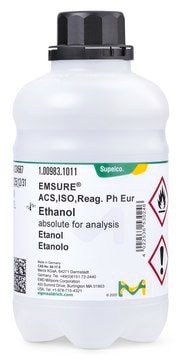1.04391
Hexane
≥98% (GC), suitable for HPLC, LiChrosolv®
Synonym(s):
Hexane, n-Hexane
About This Item
5.2 psi ( 37.7 °C)
~132 mmHg ( 20 °C)
Recommended Products
Product Name
n-Hexane, for liquid chromatography LiChrosolv®
vapor density
~3 (vs air)
Quality Level
vapor pressure
256 mmHg ( 37.7 °C)
5.2 psi ( 37.7 °C)
~132 mmHg ( 20 °C)
description
isocratic
product line
LiChrosolv®
Assay
≥98% (GC)
form
liquid
autoignition temp.
453 °F
potency
25000 mg/kg LD50, oral (Rat)
>2000 mg/kg LD50, skin (Rabbit)
expl. lim.
7.7 %
technique(s)
HPLC: suitable
impurities
≤0.0002 meq/g Acidity
≤0.0002 meq/g Alkalinity
≤0.01% Water
evapn. residue
≤1.0 mg/L
transmittance
210 nm, ≥50%
220 nm, ≥85%
245 nm, ≥98%
refractive index
n20/D 1.375 (lit.)
kinematic viscosity
0.50 cSt(20 °C)
bp
69 °C (lit.)
mp
−95 °C (lit.)
transition temp
flash point -22 °C
density
0.659 g/mL at 25 °C (lit.)
application(s)
PFAS testing
storage temp.
2-30°C
SMILES string
CCCCCC
InChI
1S/C6H14/c1-3-5-6-4-2/h3-6H2,1-2H3
InChI key
VLKZOEOYAKHREP-UHFFFAOYSA-N
Looking for similar products? Visit Product Comparison Guide
Related Categories
General description
Application
- analysis of food products according to united states pharmacopeia (USP) methods
- HPLC determination of foodstuffs
- extraction of lactone flavors from fatty acid feedstocks
- vitamin A analysis of fortified food matrices using UHPLC
- Soxhlet extraction of plant materials for chromatographic separation
- quantification of fat-soluble vitamins by HPLC-MS
- detection of synthetic cannabinoids (SC) in e-liquids used in electronic cigarettes
- analysis of SC in blood, urine and herbal blend samples
Features and Benefits
- packaged in glass bottles
- offers high resolution, sensitivity and optimized peak baseline separation
Preparation Note
Analysis Note
Identity (IR): conforms
Evaporation residue: ≤ 1.0 mg/l
Water: ≤ 0.01 %
Acidity: ≤ 0.0002 meq/g
Alkalinity: ≤ 0.0002 meq/g
Transmission (at 210 nm): ≥ 50 %
Transmission (at 220 nm): ≥ 85 %
Transmission (from 245 nm): ≥ 98 %
Filtered by 0.2 µm filter
Other Notes
Legal Information
Signal Word
Danger
Hazard Statements
Precautionary Statements
Hazard Classifications
Aquatic Chronic 2 - Asp. Tox. 1 - Flam. Liq. 2 - Repr. 2 - Skin Irrit. 2 - STOT RE 2 Inhalation - STOT SE 3
Target Organs
Central nervous system, Nervous system
Storage Class Code
3 - Flammable liquids
WGK
WGK 3
Flash Point(F)
-7.6 °F - closed cup
Flash Point(C)
-22 °C - closed cup
Certificates of Analysis (COA)
Search for Certificates of Analysis (COA) by entering the products Lot/Batch Number. Lot and Batch Numbers can be found on a product’s label following the words ‘Lot’ or ‘Batch’.
Already Own This Product?
Find documentation for the products that you have recently purchased in the Document Library.
Articles
The most frequently used synthetic sweeteners are: saccharin, cyclamate, aspartame, and sucralose (E955), and this application illustrate the analysis of sucralose from soy sauce following the current Chinese national standard method.
Protocols
Powdered black pepper was chosen as example for dietary supplements, being a source for pierine. It is tested according to the current United States Pharmacopeia (USP) guidelines using HPTLC and HPLC.
Our team of scientists has experience in all areas of research including Life Science, Material Science, Chemical Synthesis, Chromatography, Analytical and many others.
Contact Technical Service









